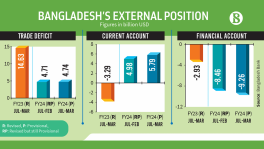A startup plans to mine the ocean floor. It could be a disaster
Despite the potential riches, more time is needed to study the potential impact on the least resilient ecosystem on the planet

The sea floor between Hawaii and Mexico is covered in potato-sized rocks that contain many of the metals necessary to make electric-car batteries. All that's needed is a way to lift them to the surface for processing. At least, that's the theory behind the Metals Co., a business formed earlier this year when the Canadian startup DeepGreen merged with a special-purpose acquisition company. As the company prepares to go public, it's touting seabed mining as a green alternative to land-based mineral extraction — and potentially a hugely lucrative business.
Not everyone is quite so optimistic. Since June, 530 marine-science and policy experts from 44 countries have signed a statement warning that seabed mining would result in environmental damages "irreversible on multi-generational timescales." That should alarm not just investors, but policy makers charged with protecting the oceans.
The Pacific basin is thought to contain more than 30 billion tons of so-called polymetallic nodules, rocks that are rich with cobalt, copper, manganese, nickel, rare-earth elements and titanium. Scientists and entrepreneurs have been researching methods of extracting them since the 1960s. In 1994, the International Seabed Authority was established to regulate mining efforts and protect the seabed environment. Any of the group's 167 member-states can stake claims to mining concessions on the ocean floor and sponsor private companies to explore them. But the ISA has not yet completed, much less approved, any regulations. So far, it's only handed out permits for exploration.

And for good reason. The deep seabed is arguably the least resilient ecosystem on the planet. In 1989, researchers dragged a plough that mimicked a mining operation across the deep Pacific; some three decades later, many of the lifeforms affected by the experiment have yet to recover. Mining polymetallic modules would likely have much worse consequences. In 2017, a report commissioned by the UK government warned that seabed mining could lead to the "extinction of unique species which form the first rung of the food chain."
The damage wouldn't be confined to the ocean floor. Plumes of sediment kicked up by mining operations could persist for months, with dire effects on sea life accustomed to clear water. Douglas McCauley, a professor at the University of California at Santa Barbara, warns the plumes might also include toxins. "Those could connect to my own dinner plate as seafood," he told me. "Tuna could feed on them, and that's a $1 billion industry." The plumes might also reduce the ocean's ability to sequester carbon — or even release stored carbon into the atmosphere — thereby worsening climate change.
Research into these impacts and whether it's possible to mitigate them (McCauley thinks not) has been underway for years. Even so, vast unknowns remain that should be resolved before mining permits are finalized. McCauley suggested that a long-term research program — similar to an effort at the United Nations intended to promote sustainable ocean use — "would give us time to get the answers."

Unfortunately, the clock is ticking. The ISA had planned to complete a code for exploiting resources by the end of 2020. As meetings were canceled during the pandemic, that date was pushed off. Then, in late June, the small Pacific nation of Nauru (population 9,770), invoked its right under the group's rules to request a fast-track adoption of mining regulations within two years. If the rules can't be finalized by then, mining will likely move ahead.
Plenty of interested parties stand to benefit. The Metals Co. holds prospecting rights over 90,000 square miles of seabed thanks to partnerships with Nauru, Tonga and Kiribati. The prospects of its public listing will surely be aided by an impending mining code.
It'll be up to investors to decide if the Metals Co.'s claims to be sustainable are plausible. (The company didn't respond to requests for comment.) In recent days, the Securities and Exchange Commission has begun to crack down on blank-check companies that misrepresent their purposes, and two environmental groups have asked that it scrutinize this deal as well. In the meantime, a pause on deep-sea mining would surely make sense. If the ISA and its members won't commit, the UN should call for a moratorium, and countries (or businesses) with commercial interests at stake should consider challenging any permits at the International Tribunal for the Law of the Sea and other legal forums.
Few industries have ever had the potential environmental impact of seabed mining. Policy makers need to ensure that the consequences don't sink us all.
Adam Minter is a Bloomberg Opinion columnist. He is the author of "Junkyard Planet: Travels in the Billion-Dollar Trash Trade" and "Secondhand: Travels in the New Global Garage Sale."
Disclaimer: This opinion first appeared on Bloomberg, and is published by special syndication arrangement.


 Keep updated, follow The Business Standard's Google news channel
Keep updated, follow The Business Standard's Google news channel
















